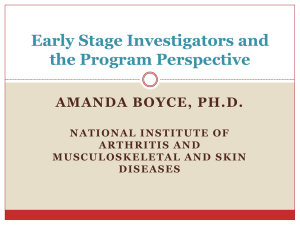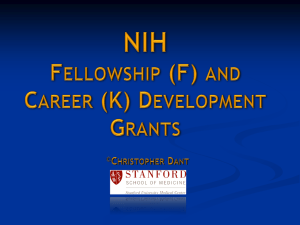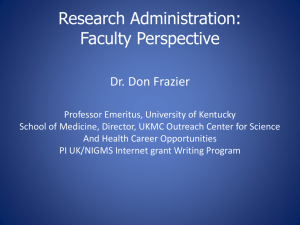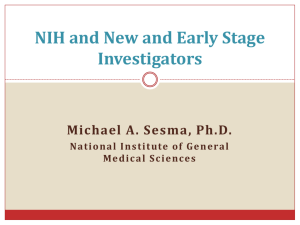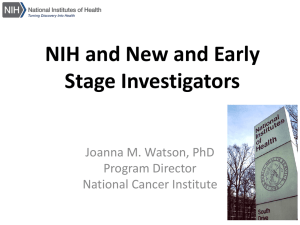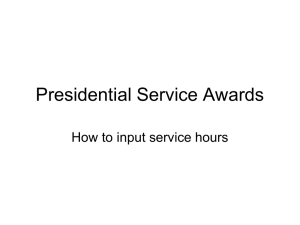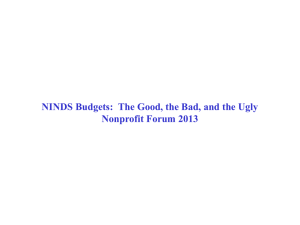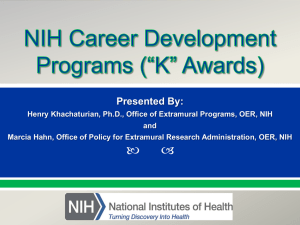Part 2: Program Perspective
advertisement
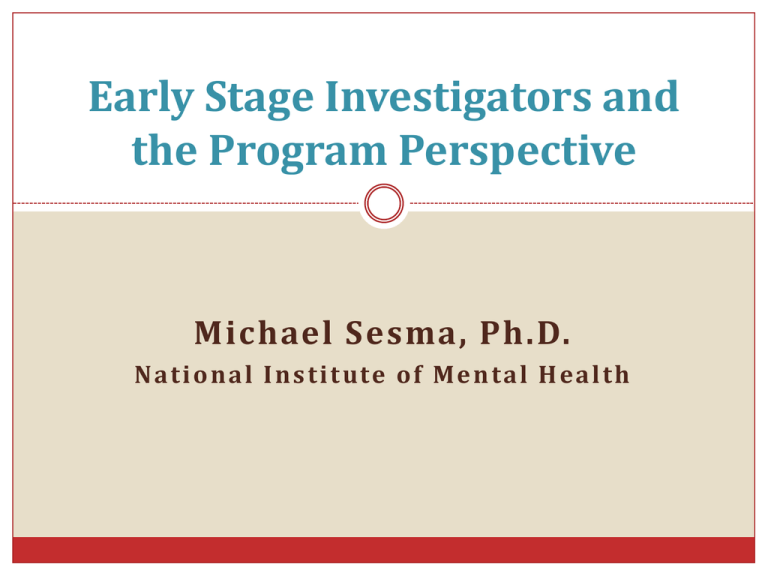
Early Stage Investigators and the Program Perspective Michael Sesma, Ph.D. N a t i o n a l I n s t i t u te o f M e n t a l H e a l t h Following up on Dr. Rockey’s talk… Get to know the Program Director for your scientific area Contact them about your research ideas Fit with institute mission and priorities Best grant mechanism or program Best study section for review Technical assistance with the application process Mentored Career Development Awards These grants provide support and “protected time” (3-5 years) for an intensive, mentored career development experience to facilitate launch of independent research careers and enhance competitiveness for new research project grant (R01) K01 Mentored Research Scientist Development Award For investigators in the biomedical, behavioral or clinical sciences to supports intensive research career development under the mentorship of an established researcher. K08 Mentored Clinical Scientist Research Career Development Award for individuals with a clinical doctoral degree to support an intensive, mentored research career development experience in the fields of biomedical and behavioral research, including translational research. K23 Mentored Patient-Oriented Research Career Development Award For investigators seeking to focus on Patient-Oriented research, i.e., “research conducted with human subjects (or on material of human origin including cognitive phenomena) for which an investigator directly interacts with human subjects.” K25 Mentored Quantitative Research Development Award For investigators from quantitative science and engineering research backgrounds seeking to to integrate their expertise with NIH-relevant research. http://grants.nih.gov/training/careerdevelopmentawards.htm Career Transition Awards K99/R00 NIH Pathway to Independence (PI) Award To facilitate a timely transition from a mentored postdoctoral research position to a stable independent research position with independent NIH or other independent research support at an earlier stage than is currently the norm. Two Phases: initial phase (K99) of mentored support to allow the candidate time to obtain additional training, complete research, publish results, and bridge to an independent research position. Second phase(R00) provides support to conduct research toward establishing his/her own independent research program and to prepare an application for regular research grant support (R01). PA-10-063; http://grants.nih.gov/grants/guide/pa-files/PA-10-063.html Project Period: K99, up to 2 years; R00, up to 3 years Budget: see specific NIH Institute and Center Career Transition Awards K22: NCI, NHLBI, NIAID, NIDCR, NIMH,NINR, NLM NCI: Transition Career Development Award – within 2 years of first independent cancer research position NIAID: Research Scholar Development – no more than 5 years of postdoctoral training – apply as a postdoctorate – grant awarded when in a tenure-track position NINR: Career Transition Award - provides up to 5 years of support in two phases. 2 years of mentored intramural experience for highly promising, postdoctoral research scientists in an NIH intramural program. 3 years of extramural support contingent on securing an independent tenure-track or equivalent research position. NLM: Independent Career Development Award for Biomedical Informatics – within 2 years of first independent cancer research position – OR after a minimum of 2 years of postdoctoral training (apply as a postdoctorate – grant awarded when in a tenure-track position) Non Mentored Career Development Awards These Career Development Grants are used by some ICs to advance investigators early in their independent careers K02 FIC: Independent Scientist in Global Health Award – within 7 years of last doctoral degree or fellowship NINDS: Independent Scientist Award – years 1-3, salary, fringe, and supplies – years 4-5: if the applicant obtains an R01 or equivalent grant, salary and fringe K07 NCCAM and NIAAA: Academic Career Award (Development Award) – for more junior investigators who are interested in developing academic and research expertise New Investigator Specific R03s NIAMS: Small Grant Program For New Investigators NIDCD: Small Grant Program – within 7 years of degree or fellowship NIDCR: Small Grant Program for New Investigators NIDDK: Small Grant Program for NIDDK K01/K08/K23 Recipients NINR: Small Grants for Behavioral Research in Cancer Control NIDA: Behavioral Science Track Award for Rapid Transition (B/START) Research Grants Available to All NIDCR Small Research Grants for Data Analysis and Statistical Methodology applied to Genome-wide Data (R03) “Investigators who have not previously received funding from NIDCR as a Principal Investigator are encouraged to apply.” NIDA: Early Career Award in Drug Abuse & Addiction (ECHEM) - R21/R33 A Phased Innovation grant for new-to-NIH, newly independent investigators and investigators without previous NIH funding to conduct basic chemistry research applied to drug abuse and addiction and relevant to the NIDA’s Mission . R21 is a research grant mechanism not a new investigator grant NIAID: “New investigators who feel unready to compete for an R01 are using the R21 successfully to gather preliminary data for their R01 applications.” NIAMS: “Projects that will be considered a lower priority include new investigator starter grants.” NIDDK: “R21s should NOT be used by new investigators to gather preliminary data for a standard R01.” NINDS: “FY 2009 success rates for NINDS R21 New Investigators: 11% vs. NINDS R01 New Investigators: 19%” Loan Repayment Program Commit to perform research for 2 years, and the NIH repays up to $35,000 per year of your qualified educational debt and covers the resulting taxes. You must be conducting research in of the following 5 areas: Clinical Research Pediatric Research Contraception & Infertility Research Health Disparities Research Clinical Research for Individuals from Disadvantaged Backgrounds http://www.lrp.nih.gov/ Common Funding Strategies for ESIs Setting a flexible (better) payline for ESI R01 applications Limiting Institute-specific administrative cuts Supporting ESIs for five years (many Institutes only fund 4 year R01s) Partial “bridge” funding http://grants.nih.gov/grants/new_investigators/ Special Funding Strategies for ESIs NHLBI: priority funding for the first competitive renewal. (1) The individual cannot be a principal investigator on an Independent Scientist and/or other non-mentored career award or on another R01 or a sub-project director on a multi-project award, and (2) must be currently holding a position at a domestic institution with a faculty rank up to and including an Associate Professor or equivalent. NIAAA: ESIs just beyond the NIAAA nominal payline are invited to submit a letter to respond to the summary statement critique. These responses are reviewed by Program staff, and when deemed appropriate, the application may be recommended to Institute leadership for award. NICHD: Special funding consideration will be given to research project grant applications submitted by new investigators supported by NICHD Career Development Awards (Ks). To Reiterate… Get to know the Program Director for your scientific area!
